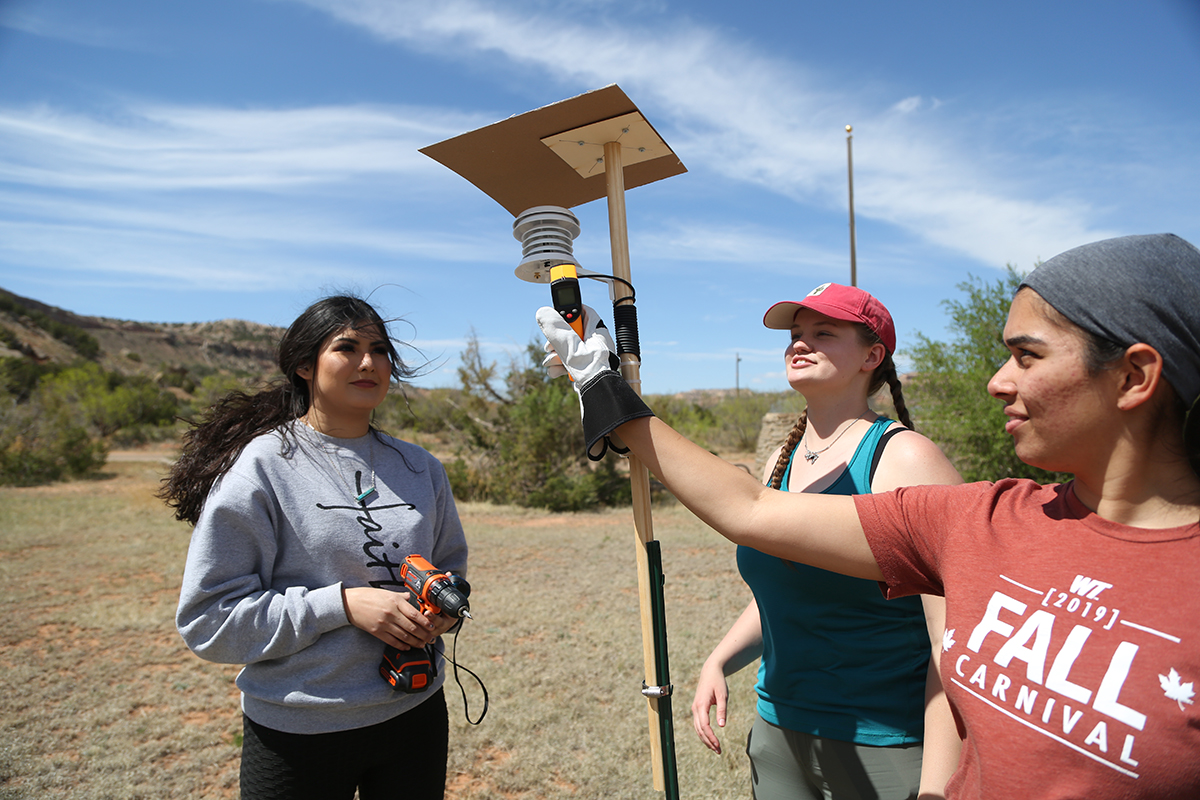Follow us @wt_natural_sciences
Environmental Science Program Details and Information
Environmental Science M.S. (Major Code: 5105)
Admission Requirements
In addition to University requirements for admission, the applicant must:
- Have a bachelor’s degree in biology, environmental science, or a related field from an accredited institution.
- Complete all requirements for admissions to the Graduate School before the end of the first semester of graduate course work. (See “Admission to Graduate School”)
- Have an overall grade point average of a minimum of 2.85.
- NOTE: M.S. in Environmental Science program no longer requires the GRE for admissions.
Admission may be granted for students with less than the minimum grade point average or test scores following a conditional period of 12-15 hours of enrollment in graduate work with no grade below a “B.” Students with undergraduate degrees in fields other than biology or environmental science may be required to complete specific leveling courses, such as organic chemistry, basic statistics (or equivalent math course; e.g., MATH2413), physical geology, hydrogeology, and/or microbiology.
Admission to the program is selective. Students interested in a master’s research assistantship are strongly encouraged to visit campus and/or remotely meet with the faculty in their proposed academic study area. Students are encouraged to identify/contact Master’s committee chair and/or academic supervisor willing to supervise coursework and/or thesis research project(s).
In addition to meeting the above-mentioned admission requirements, international students desiring to pursue the Master of Science degree in biology or environmental science must submit one of the following minimum test scores (for all requirements see the International Students - Applicants webpage: http://wtamu.edu/student-support/international-applicants.aspx):
- TOEFL - score of 233 (computer based); 90-91 (iBT); or 575-477 (paper based)
- IELTS - score of 6.5 overall
- PTE - score of 62
Areas of Specialization:
- General Environmental Science
- Human and Ecological Risk Assessment
- Air Quality and Atmospheric Science
Requirements
Student must complete 36 credit hours including core, specialization, and elective courses.
Master of Science Degree Core Requirements—All Specializations (20 hours)
-
- ENVR 6303 - Advanced Scientific and Numerical Methods 3
- ENVR 6305 - Geographic Information Systems or ET 6305 – Geographic Information Systems 3
- ENVR 6509 - Human Ecology 5
- ENVR 6111 - Seminar 3 (students must enroll in three different seminar classes)
- ENVR 6320 - Environmental Regulations 3
- ENVR 6350 - Applied Hydrogeology or ENVR 6304 Ecological Risk Assessment or ENVR 6092 Special Topics-Earth and Atmospheric Chemistry 3
|
Semester of Entry |
Priority Deadline for Graduate Assistant, Teaching (GAT) positions |
Application Deadline |
|---|---|---|
|
Fall |
February 1 |
August 1 |
|
Spring |
September 1 |
December 1 |
|
Summer |
N/A |
May 1 |
OPTION I
Environmental Science M.S., General Environmental Science Specialization
Master of Science Degree Core Requirements—listed above (20 hours)
Elective Courses in Specialization Area (10 hours)
Agriculture, biology, chemistry, geology, engineering technology, and environmental science.
Additional Requirements for Thesis Option (6 hours)
- ENVR 6301 - Thesis 3
- ENVR 6302 - Thesis 3
- Successful completion of a thesis defense (Thesis topic will be decided based on the interest of student and adviser’s expertise.)
Additional Requirements for Non-Thesis Option (6 hours)
- ENVR 6395 - Research Problems in Environmental Science 3 (Research topic will be decided based on the interest of student and adviser’s expertise)
- ENVR 6098 - Graduate Internship in Environmental Science 1-3
- Successful completion of comprehensive written and oral exams
OPTION II
Environmental Science M.S., Human and Ecological Risk Assessment Specialization
Master of Science Degree Core Requirements—listed above (20 hours)
Courses in Specialization Area (10 hours)
- ENVR 6304 Ecological Risk Assessment 3
- ENVR 5306 Hazardous Waste Site Assessment (if student has not taken ENVR 4306 as an undergraduate) 3
- Electives in agriculture, biology, chemistry, engineering technology, or environmental science 4-7
Additional Requirements for Thesis Option (6 hours)
- ENVR 6301 - Thesis 3
- ENVR 6302 - Thesis 3
- Successful completion of a thesis defense (Thesis will focus on a specialized topic relevant to Human Ecological Risk Assessment.)
Additional Requirements for Non-Thesis (6 hours)
- ENVR 6395 - Research Problems in Environmental Science 3 (Research will focus on a specialized topic relevant to Human Ecological Risk Assessment.)
- ENVR 6098 - Graduate Internship in Environmental Science 1-3
- Successful completion of comprehensive written and oral exams
OPTION III
Environmental Science M.S., Air Quality and Atmospheric Science Specialization
Master of Science Degree Core Requirements (20 hours)
Courses in Specialization Area (10 hours)
- ENVR 5308 Fundamentals of Air Quality 3 (if not taken as ENVR 4308 at the undergraduate level)
Note: course numbers are subject to change.
- ENVR 6092 Special Topics - Earth and Atmospheric Chemistry or ENVR 5311 Modeling Earth and Environmental Systems 3 (if not taken as ENVR 3092 or ENVR 4311 at the undergraduate level)
Note: course numbers are subject to change.
- Electives in agriculture, biology, chemistry, engineering technology, or environmental science 4-10
Additional Requirements for Thesis Option (6 hours)
- ENVR 6301 - Thesis 3
- ENVR 6302 - Thesis 3
- Successful completion of a thesis defense (Thesis will focus on a specialized topic relevant to Air Quality and Atmospheric Science.)
Additional Requirements for Non-Thesis (6 hours)
- ENVR 6395 - Research Problems in Environmental Science 3 (Research will focus on a specialized topic relevant to Air Quality and Atmospheric Science.)
- ENVR 6098 - Graduate Internship in Environmental Science 1-3
- Successful completion of comprehensive written and oral exams
Note: For this specialization in air quality and atmospheric science, it is recommended that students take the following courses as leveling work (if not already taken for the B.S. degree):
- GESC/GEOG 3313 – Meteorology
- GESC 3303 – Oceanography
- CHEM 3511 – Analytical Chemistry
- MATH 2413 – Calculus I (or equivalent)
It is encouraged that students who choose the Air Quality and Atmospheric Science specialization have interests in the following specific area(s):
- Atmospheric or Oceanographic Dynamics
- Atmospheric or Oceanographic Thermodynamics
- Physical Meteorology or Physical Oceanography
- Synoptic Meteorology (or Weather Systems) or Synoptic Oceanography
Or any advanced courses related to the abovementioned courses
For more information, please contact ENVR Graduate School Program Advisor Dr. William Jim Rogers (jrogers@wtamu.edu).


